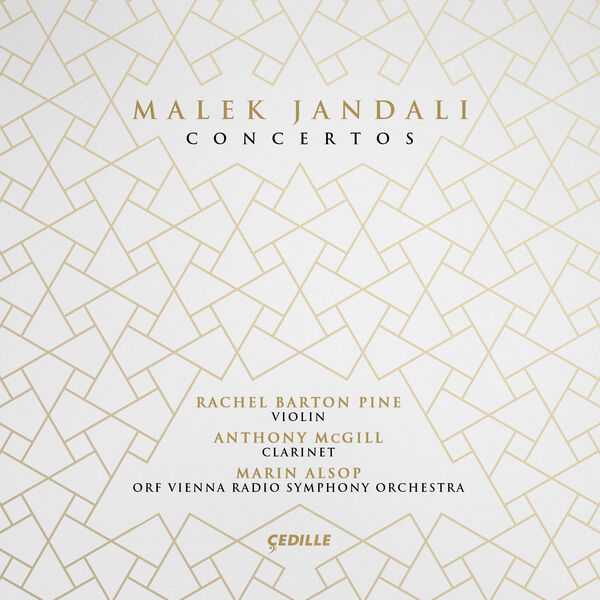

Composer: Malek Jandali
Performer: Rachel Barton Pine, Anthony McGill
Orchestra: ORF Vienna Radio Symphony Orchestra
Conductor: Marin Alsop
Format: FLAC (tracks)
Label: Cedille
Catalogue: CDR90000220
Release: 2023
Size: 1.02 GB
Recovery: +3%
Scan: cover
Violin Concerto
01. I. Allegro moderato
02. II. Andante
03. III. Allegretto
Clarinet Concerto
04. I.Andante misterioso—Più mosso
05. II. Nocturne: Andante
06. III. Allegro moderato
Clarinetist Anthony McGill and violinist Rachel Barton Pine are featured soloists on a new recording of two concertos composed in response to societal injustices by Syrian composer Malek Jandali, performed by the ORF Vienna Radio Symphony Orchestra and led by Marin Alsop, a champion of the composer’s work. Malek Jandali, called “deeply enigmatic” by Gramophone, has been praised for writing “heart-rending melodies, lush orchestration, clever transitions and creative textures” (American Record Guide). His repertoire, which ranges from chamber music to large scale orchestral works, integrates Middle-Eastern modes into Western classical forms and harmony. Rachel Barton Pine, “an exciting, boundary-defying performer” (The Washington Post), performs Jandali’s Concerto for Violin and Orchestra (2014), a work that honors “all women who thrive with courage” according to the composer. Jandali’s concerto is in recognition of the women of Syria, continuing his aim to preserve the cultural heritage of his homeland. The Violin Concerto incorporates Syrian melodies and idioms into Jandali’s Western-inspired harmonies and forms. Jandali calls upon an array of Syrian and Arabic music forms and folk melodies including multiple samā’i and bashraf (instrumental pieces), and longa (dances), from different maqam (modes). He also makes use of the oud (Arabic lute) in his symphonic scoring to infuse the work with the authentic sound and feeling of Syria. A particularly notable samā’i inspired by traditional Syrian folk music from the area along the Silk Road Is used for a “Women’s Theme.” This theme is representative of the folk music that is a source of comfort and healing for unjustly detained, peaceful Syrian activists and other women and mothers living in fear. Jandali’s Concerto for Clarinet and Orchestra (2021) is dedicated to its performer Anthony McGill (“the total package…stylish, passionate and limitlessly fluent on the clarinet,” Bachtrack), “in memory of all victims of injustice.” McGill says of the work, ”In the midst of the pain and the violence and injustice in the world all we are left with is the ability to pour our hearts and our souls into something more beautiful, into something more powerful, so it can communicate throughout all time and live on.” Like all of Jandali’s works, the clarinet concerto is infused with ancient themes from Jandali’s homeland as a means of preservation. Jandali explores variations on themes from old and traditional Syrian musical forms and modalities, with striking musical effects and wide ranging highs and lows in the orchestral writing.
The fusion of Western musical forms and tonality with music from parts of the world shaped by what Westerners call mode can be quite difficult, surprisingly so, since Western tonality evolved from an adaptation of modes. This is true from both ends of the spectrum: Ravi Shankar, in his Concerto for sitar and orchestra, dispensed with the strings and essentially turned the orchestra into a giant percussive accompaniment. Western composers often turn to orientalisms that have little or nothing to do with the source material. All this makes the work of composer Malek Jandali all the more interesting, and here, he adopts the concerto form in a Violin Concerto and Clarinet Concerto, a fine vehicle for his ideas inasmuch as the division between Western and Middle Eastern elements is mapped onto that between tutti and soloists. It would be interesting to hear an evaluation of this album by a player or writer from the Syrian tradition. To these ears, it sounds like each element of the mixture is inflected somewhat to make it fit with the other. The tonal material of the tutti is derived from the maqam or mode of the soloists’ parts, while those parts adopt the motion dynamic of Western concertos to a degree; each concerto is in the usual three-movement form, and there are strong suggestions of conventional concerto structure. The performances by violinist Rachel Barton Pine and clarinetist Anthony McGill (the clarinet concerto’s dedicatee) are excellent, with McGill handling the unusual texture Jandali calls for. The album also contains layers of philosophical and moral significance, reflecting on the past of the Syrian people and their loss of freedom in the present. A fascinating release with much to chew on that should be played anew in cities with large immigrant populations.